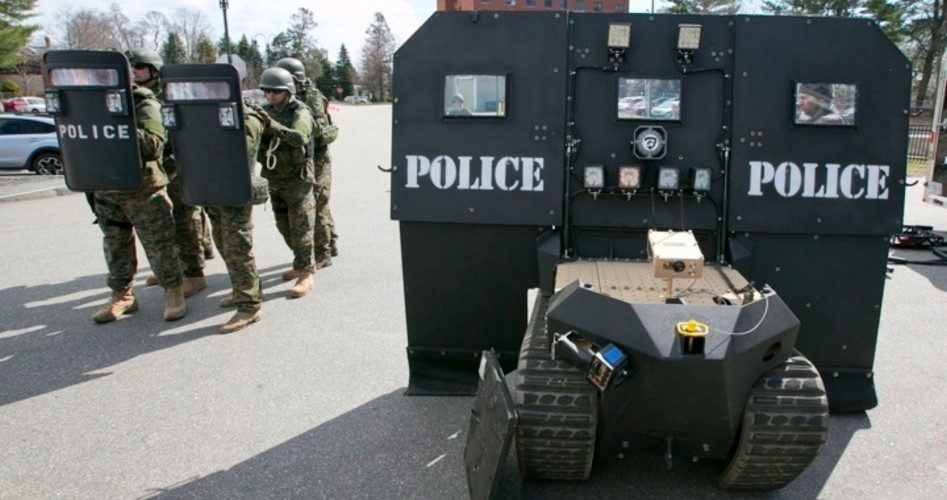
Robots, facial recognition, and drones. These are the technologically advanced tools that used to belong to the military, but are now commonplace in local police departments.
As The New American has reported, police departments and sheriff’s offices around the country every day look less like peace officers and more like warfighters.
Using threats of terrorism as a pretext, police are buying (or receiving in free grants) tools developed for the armed forces and using them to carry out police raids or even to serve a simple warrant.
Unfortunately, it seems that if police departments have these million-dollar vehicles, weapons, and software, they will use them.
Jim Fitzgerald worked for eight years as a vice and narcotics squad detective in Newark, New Jersey, before joining the staff of The John Birch Society. He is point man for the conservative organization’s “Support Your Local Police” initiative.
In an interview with The New American, Fitzgerald said there is “virtually no use” for the military-grade equipment being bought by local law enforcement with DHS grant money.
“The only reason to have this equipment is to use it,” Fitzgerald said, and it is likely it would be used against local citizens who have risen up and created some sort of civil disorder.
The assault, then, on civil liberties is coming not just from Capitol Hill, but from police precincts down the street.
The impoverished city of Oakland is spending more than $10 million on a “Domain Awareness Center” surveillance hub for its cops, and cameras that track every license plate they see. Baltimore and NYC track license plates, too. Meanwhile, according to the LA Times, “Unmanned aircraft from an Air Force base in North Dakota help local police with surveillance,” and Motherboard reports: The Border Patrol’s fleet of Predator drones were loaned out 248 times in 2012, to “unnamed sheriff’s departments, the Department of Defense, the DEA, the Texas Rangers, and even the Bureaus of Land Management and Indian Affairs.”
From license plate readers to facial recognition software, from surveillance cameras to cellphone signal trackers, the Department of Homeland Security is providing police with all the gadgets, hardware, and software necessary to keep everybody under surveillance, without the targeted public ever realizing that it’s the Capitol, not the cops, that are behind the monitoring.
Local police who participate in the program will have access to a shockingly broad array of personal information of citizens. Facial recognition technology, license plate readers, and stop light camera video feeds will all be funneled to a Regional Operations Intelligence Center where FBI, police, and DHS agents can watch the live feeds.
The threat has been creeping up on us for a while now.
Over two years ago, Business Insider reported on the increasingly militaristic materiel being bought by police:
The U.S. military has some of the most advanced killing equipment in the world that allows it to invade almost wherever it likes at will.
We produce so much military equipment that inventories of military robots, M-16 assault rifles, helicopters, armored vehicles, and grenade launchers eventually start to pile up and it turns out a lot of these weapons are going straight to American police forces to be used against US citizens.
In a story published in The Daily, Tim Lynch of the Cato Institute said, “The trend toward militarization was well under way before 9/11, but it’s the federal policy of making surplus military equipment available almost for free that has poured fuel on this fire.”
The Daily continues:
Thanks to it, cops in Cobb County, Ga. — one of the wealthiest and most educated counties in the U.S. — now have an amphibious tank. The sheriff of Richland County, S.C., proudly acquired a machine-gun-equipped armored personnel carrier that he nicknamed “The Peacemaker.”
This comes on top of grants from the Department of Homeland Security that enable police departments to buy vehicles such as “BearCats” — 16,000-pound bulletproof trucks equipped with battering rams, gun ports, tear-gas dispensers and radiation detectors. To date, more than 500 of these tank-like vehicles have been sold by Lenco, its Massachusetts-based manufacturer, according to a report in the Orlando Sentinel.
From the arsenal to the attitude, police are acting less like public servants and more like special forces.
In an essay published in the Wall Street Journal last August, Radley Balko, author of Rise of the Warrior Cop, presented chilling and convincing evidence of the blurring of the line between cop and soldier:
Driven by martial rhetoric and the availability of military-style equipment — from bayonets and M-16 rifles to armored personnel carriers — American police forces have often adopted a mind-set previously reserved for the battlefield. The war on drugs and, more recently, post-9/11 antiterrorism efforts have created a new figure on the U.S. scene: the warrior cop — armed to the teeth, ready to deal harshly with targeted wrongdoers, and a growing threat to familiar American liberties.
Balko rightly connects the menace of the martial police with the decline in liberty and a disintegration of legal boundaries between sheriffs and generals:
Americans have long been wary of using the military for domestic policing. Concerns about potential abuse date back to the creation of the Constitution, when the founders worried about standing armies and the intimidation of the people at large by an overzealous executive, who might choose to follow the unhappy precedents set by Europe’s emperors and monarchs.
Cato Institute’s Tim Lynch points out the creep of the combat attitude. “It’s kind of had a corrupting influence on the culture of policing in America,” Lynch says. “The dynamic is that you have some officer go to the chief and say, people in the next county have [military hardware], if we don’t take it some other city will. Then they acquire the equipment, they create a paramilitary unit, and everything seems fine.
“But then one or two years pass. They say, look we’ve got this equipment, this training and we haven’t been using it. That’s where it starts to creep into routine policing.”
The John Birch Society’s Jim Fitzgerald agrees. DHS, Fitzgerald believes, may be anticipating these riots and looks to them as a justification for the militarization of the police. “They [DHS grants] are not good, not healthy, and not constitutional,” Fitzgerald added.
Finally, there is nothing in the Constitution authorizing the federal government to dole out the billions of dollars in grants that are behind the militarization of the police.
The solution, then, to the military tactics, training, tools, and technology being deployed by local law enforcement could be the application of the Tenth Amendment.
The Tenth Amendment mandates that if the power isn’t granted to the federal government in the Constitution, then authority over that area remains with the states and the people.
Naturally, the bureaucrats in charge of keeping the cash flowing from the Department of Homeland Security to police and sheriffs want to keep the spigot open.
This transfer of technology and materiel will separate the police from the people they serve and make them dependent on their would-be bosses in Washington, D.C.
Police, unless the people stand up and interpose, will become nothing less than federal security agents sworn not to protect and to serve their neighbors, but to protect the prerogatives of politicians.
Photo of team of police and SWAT robot in Sanford, Maine: AP Images
Joe A. Wolverton, II, J.D. is a correspondent for The New American and travels frequently nationwide speaking on topics of nullification, the NDAA, the Second Amendment, and the surveillance state. He is the co-founder of Liberty Rising, an educational endeavor aimed at promoting and preserving the Constitution. Follow him on Twitter @TNAJoeWolverton and he can be reached at [email protected].



